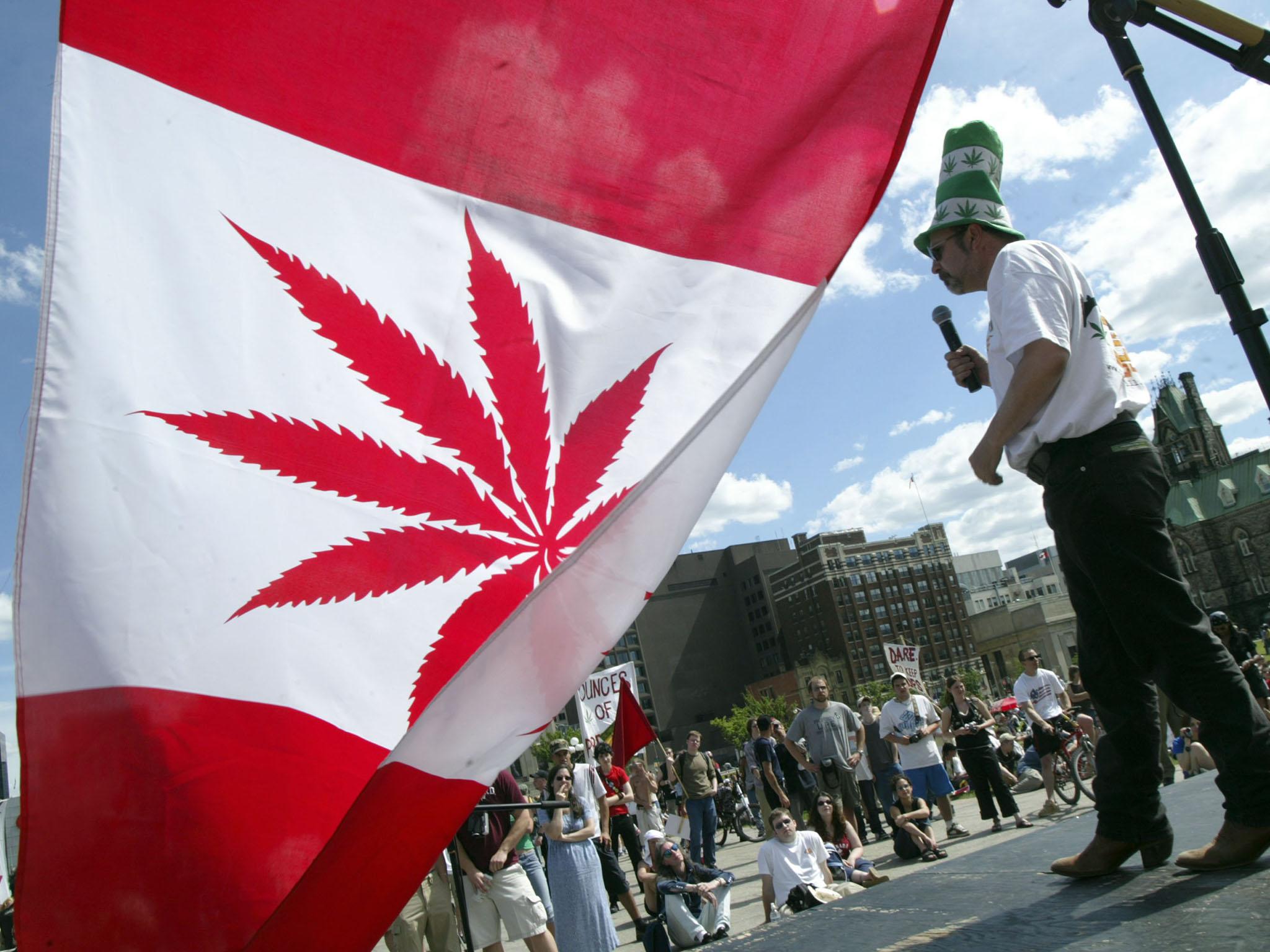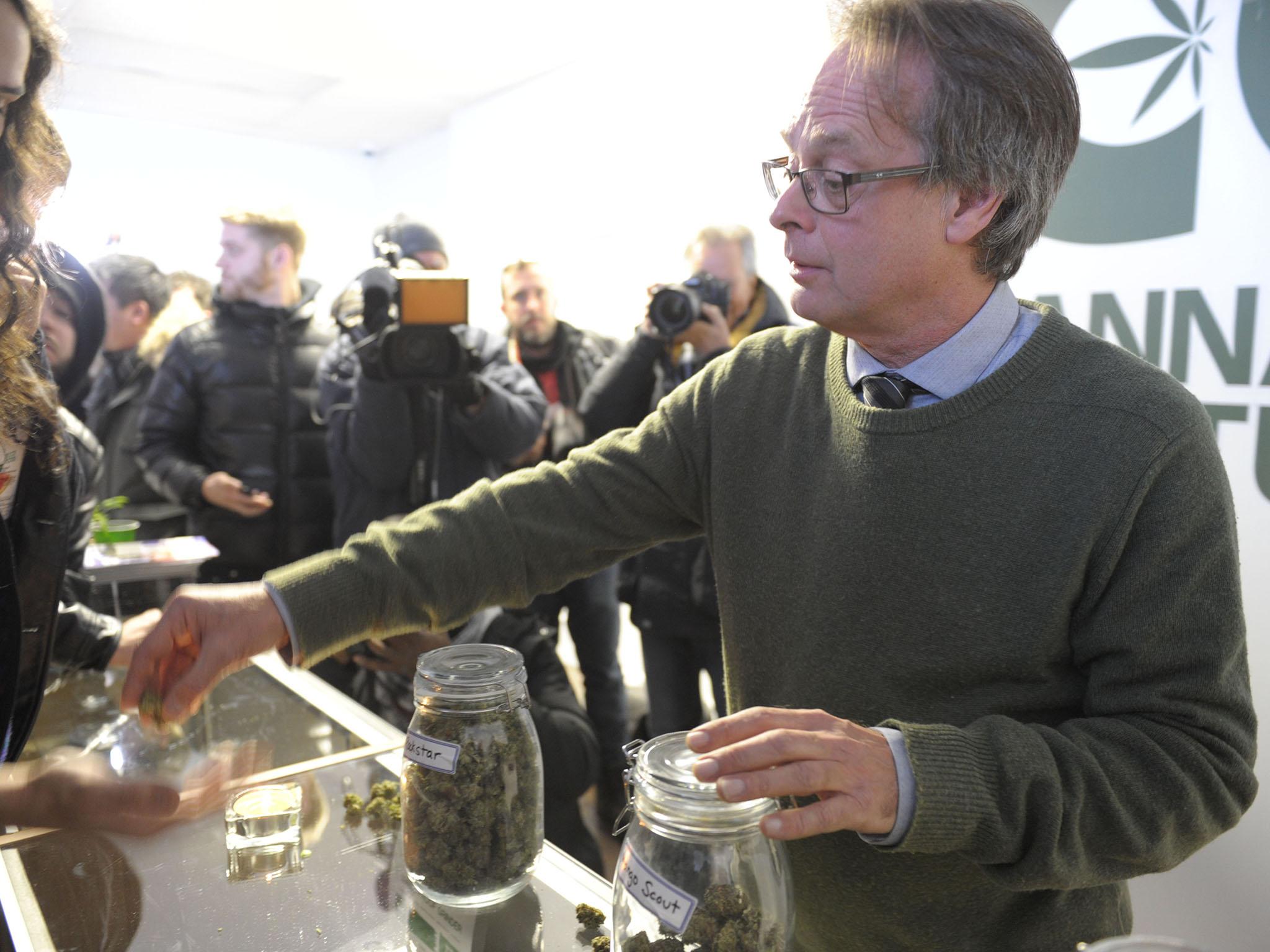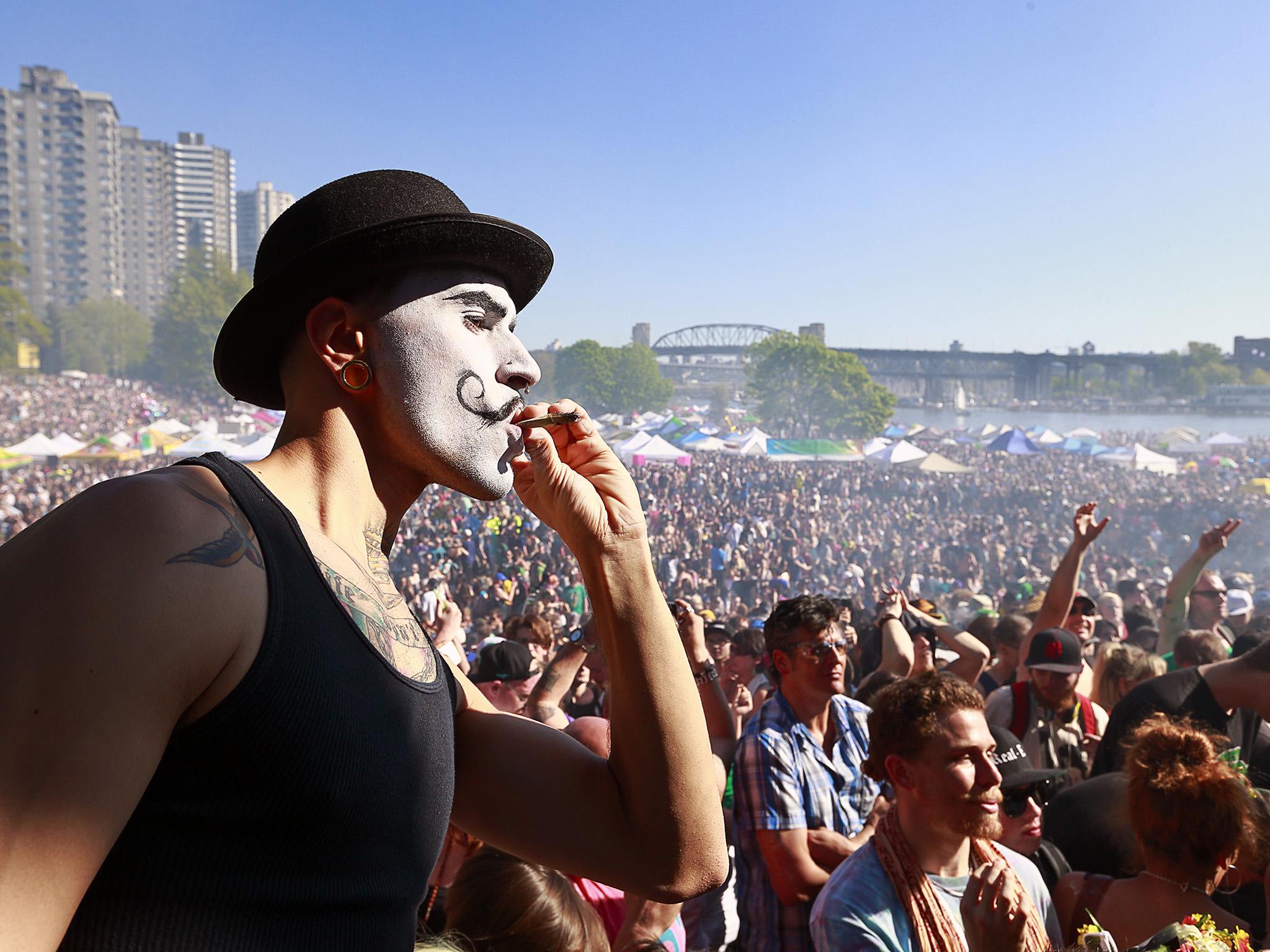Canada's rocky road journey to legalising cannabis
As the first major economy in the world is on the brink of legalising cannabis, is Canada ready for the drug to be commodified and sold as a named brand?

Your support helps us to tell the story
From reproductive rights to climate change to Big Tech, The Independent is on the ground when the story is developing. Whether it's investigating the financials of Elon Musk's pro-Trump PAC or producing our latest documentary, 'The A Word', which shines a light on the American women fighting for reproductive rights, we know how important it is to parse out the facts from the messaging.
At such a critical moment in US history, we need reporters on the ground. Your donation allows us to keep sending journalists to speak to both sides of the story.
The Independent is trusted by Americans across the entire political spectrum. And unlike many other quality news outlets, we choose not to lock Americans out of our reporting and analysis with paywalls. We believe quality journalism should be available to everyone, paid for by those who can afford it.
Your support makes all the difference.For many, Canada’s Prime Minister Justin Trudeau can do no wrong. Telegenic, young and liberal-minded, he’s delivering on an election promise that will cement his reputation with young voters and baby-boomers alike: the legalisation of cannabis.
In some ways, cannabis legalisation is one of those issues like same-sex marriage, or decriminalised abortion, that speaks to a sense of social progress. Certainly in Canada, it finds widespread acceptance; 68 per cent of the public are in favour of legalisation, according to Canadian pollsters Forum Research.
It will become operative next July: a move that makes Canada the first industrialised country to properly bring legal cannabis to market. And some cannabis entrepreneurs now think the country could allow the burgeoning industry to fully mature.
“We think Canada will be pivotal,” says Troy Dayton, CEO of the Arcview Group, which has provided investor services and market research in the cannabis industry since 2010. “Investors are very excited about Canada.”
Arcview, which thinks the legal cannabis market will be worth $10.2bn (£6.2bn) by 2018, is now betting on Canada to consolidate the gains made by the US – particularly Colorado, currently the most sophisticated cannabis market in the world. But while cannabis is legal (to a lesser or greater extent) in 29 states, the US cannabis industry is held back by a lack of federal backing.
“Canada is the tenth largest economy in the world, and the first major economy to legalise cannabis,” says Dayton. “There’s no state-federal conflict as there is in the US. We’re very excited about it, and so is the Canadian Government.”
As well they might, for a bonanza is expected. A 2016 Deloitte report estimated the potential worth of the legal Canadian marijuana market to C$22.6bn (about £13.72bn) a year, building on the country’s already established medical marijuana market. The 3.5 million Canadians who are estimated to use cannabis are expected to respond favourably to next summer’s gift – and businesses are circling.
“A lot of expertise has built up in Colorado, which is itching to go abroad without the constraints,” adds Dayton. “Canada will lap the US and be an incredible powerhouse.”
Other social gains are expected. It will have a big export market, knock-ons for tourism – Denver is a thriving model with specialist hotels like Bud & Breakfast – and it’ll add jobs and reduce crime, as Canadians switch from an illegal to a regulated market.

Moreover – and this is where Governments start to listen – there’ll be a big tax take. Canada’s starting tax is $1 per gram on cannabis. One estimate is that Colorado has pulled in $506m since retail sales began in 2014, which will be exceeded in Canada – although Trudeau is initially likely to bring on a low tax regime to keep criminal elements out.
***
Yet plenty of niggles remain, particularly around the marketing of cannabis. Should it be restricted? Here, Canada is still making up its mind. Cam Battley, executive vice-president at Canada-based Aurora Cannabis, recommended a system like alcohol: a sector where restrictions in advertising exist and access for children denied.
But all kinds of ideas are being sailed, from plain packaging to other restrictive practises. One committee suggested that cannabis might have names, like apples or chewing gum: markers rather than attractors. And there are state differences to observe. Toronto lawyer Paul Lewin, who specialises in cannabis cases, says Ontario’s plan – to control cannabis sales through 150 outlets run by the regional alcohol monopoly – will drive it back into criminal hands, which he’s called a kind of “prohibition”.
And will it be packaged and branded, and if so, will it be marketed like tobacco and alcohol, or like foodie products like dark chocolate? “I think of it like craft beer,” says Dayton.
In Colorado, the most mature market in the US, Dayton says there has been “consolidation”. He adds: “There’s a branding boom. Certain brands are already rising to the top.”
Among the top sellers are Incredibles, Kiva and Dixie Elixir. There’s Hamptons Reserve from Future Farm, which boasts of being a “leading cannabis brand for sophisticated consumers”. Toast is a cannabis cigarette and a “luxury lifestyle brand for adults who smoke marijuana socially”, while ‘No. 420’ was inspired by “classic brands like Chanel No. 5 or Porsche 911”, containing the cannabis code number 420. And here, again, Canada might steal a march on its neighbour; in the US, they can’t be trademarked and copyrighted due to the federal law.
Small wonder that in Canada businesses are getting into place. Tokyo Smoke, which opened last summer in Toronto, is a smart retail flagship with great coffee, artworks, bongs, cork walls and a cool concrete bar. The only thing missing is the weed itself. Good outlets are being snapped up; although the current ambiguity is holding some back.

Such outlets follow America’s example, where there’s definitely been a move to chic rather than Cheech and Chong. The “dispensary” system operates a kind of happy medium between the medical and recreational model: some are like apothecaries, branches of Wholefoods or Apple Store-style retail temples offering soothing soundtracks of classical and new age music.
They are not like Amsterdam’s “coffee shops” or sleazy “head shops”, and as with the US, Canada hopes to attract horticultural graduates, tech whizzes and MBAs to the industry rather than stoners. Still, you’ll have to jump through hoops to become a licensed producer: a process that involves background checks, up to three years of form-filling and good staff.
As Kris Krane of cannabis industry start-up 4Front ventures said: “We’re trying to educate the market. These people have 10-15 day training, akin to a pharmacy.” And the reward is an average dispensary spend of a cool US$50-$80.
At the same time, Dayton is concerned about Canada’s big-state approach. “They tend to like heavy regulation and limited licensing,” he says. “But it’s not plutonium. It doesn’t need to be regulated as such.”
He’s likely to be thwarted. Ex-police chief Bill Blair, who is working with Trudeau on cannabis legalisation, says Canada has the highest rates of cannabis usage in the world, pointing out: “You can’t regulate something that’s prohibited.”
But as Troy Dayton observes: “The idea that there will be generic unbranded cannabis is absurd. It’s through branding and advertising that people discover new products and new ways of consuming it.”
There tend to be “lines” like the cosmetics market, he urges, where one brand name covers several products – which raises another point about the new cannabis culture: that smoking with tobacco is often anathema. Instead, there are vapes, concentrates, pills tinctures, edibles, and as Dayton puts it, “ranges that include high CBD (cannabidiol) strains that make you want to party, low CBD brands that make you creative.”
He adds that it’s the oldies, the baby boomers, who want old-fashioned joints, and that there’s also a huge ancillary industry of home kits, phone apps and gardening tips – in Canada, anyone of legal age will be allowed to grow up to four marijuana plants for their own consumption.
***
As the cannabis market matures, it is becoming more normalised. Lucie Greene, worldwide director of The Innovation Group at advertising agency JWT, has watched it develop. “We’ve seen new products, agencies and services expanding the market for cannabis beyond stereotypical student stoners and baby boomer hippies,” she says.
“New products are positioning it as a wellbeing ingredient: something other than alcohol (more natural) to help you to relax – and there’s a whole wave positioned on a premium way for affluent women.” These marketing propositions run on scent and flavour rather than strength, and they’re part of the reason why Canadians support legalisation in principle.
Many are looking forward to next July. But it would be wrong to say the country is sanguine. As well as fears that Canada won’t be ready – Forum’s poll found that 57 per cent were unconfident that there would be a legal framework for cannabis sales by July, and 48 per cent were worried that legalisation would lead to increased consumption among the young.
The Quebec Association of Psychiatrists has warned about health issues, including ADHD and an increased risk of psychotic disorders: fears that play into the hands of those who argue for plain packaging. The counter-argument is that nameless brands promote illegality and fraud.
But if the US has kickstarted the cannabis industry, it looks like Canada will push it further than it has ever been before – “like America but better”, as the old Canuck saw goes.
Where is cannabis legal?
US
In the United States, 29 states have legalised cannabis to differing levels. But cannabis remains illegal at the federal level, causing a lack of continuity across the country.
Uruguay
Uruguay is the only country with a full regime for the legalised sale of cannabis – but it’s not a free-market approach. Drug users must register with the government and machines scan buyers’ fingerprints on purchase, and there are quotas to stop overuse.
Jamaica
Jamaica has already legalised the use of medical marijuana, and has its sights on “wellness tourism” via recreational weed. Local products include the app Ganjagram and Marley Brand Coffee.
UK
Not such a slouch, the country is a big seed producer and has a small medical cannabis industry. Legalisation is not planned, but if it were, the model would be more like Uruguay than Colorado – despite Green Party councillor Ben Duncan in 2012 calling for cannabis cafes to be licensed in Brighton.
Netherlands
Notorious for its coffee shops, the Netherlands is the classic cannabis destination. But it’s not totally free: while it’s legal for coffee shops to sell cannabis, it’s illegal to buy and cultivate cannabis, which means there’s criminality in the supply chain. The pragmatic Dutch are working on it.
Join our commenting forum
Join thought-provoking conversations, follow other Independent readers and see their replies
Comments